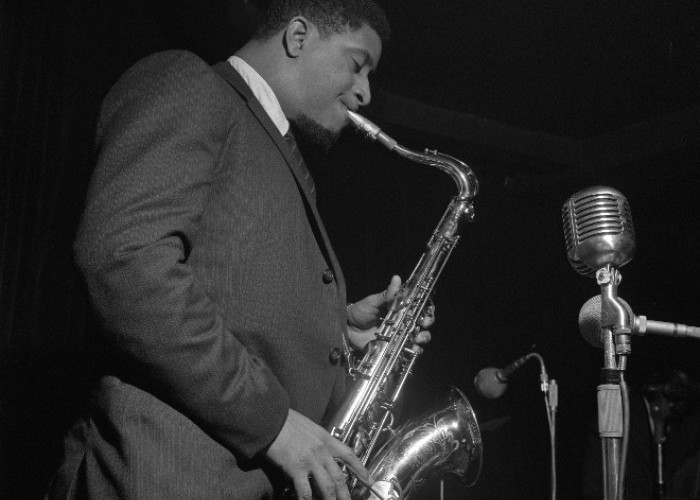Jan 13, 2026 2:09 PM
More Trump-Kennedy Center Cancellations
The fallout from the renaming of the John F. Kennedy Center for the Performing Arts to include President Donald…

Sonny Rollins’ A Night At The Village Vanguard was the first album documenting the saxophonist as a bandleader in live performance.
(Photo: Francis Wolff/Blue Note Records)So much praise has been heaped (deservedly) on tenor saxophonist Sonny Rollins’ A Night At The Village Vanguard since its initial release 45 years ago and its subsequent, ever-more-complete “definitive” reissues that more words might seem superfluous. But it is never wrong to point out what’s so great about this legendary recording, the first documenting Rollins as a bandleader in live performance and the first-ever jazz taping at the Vanguard, Rudy Van Gelder in command.
And more of a great thing is what distinguishes A Night At The Village Vanguard: The Complete Masters (Blue Note; 130:40 ★★★★★) from Blue Note’s 1999 CD. Not more music: more words. The earlier version had all 18 tracks from Nov. 3, 1957; now hear the 27-year-old tenorman’s confidently casual patter with his up-close audience. The new package’s booklet also has informative essays by Nate Chinen and Bob Blumenthal, an excerpt from Aidan Levy’s Rollins biography, an interview by Blue Note’s main man Don Was and Leonard Feather’s original liner notes. A text by producer Joe Harley explains this Complete Masters is the first to use Van Gelder’s newly discovered original source material.
The sound’s good; I’m no audiophile, and anyway the beauty bursting from Rollins with bassist Wilbur Ware and drummer Elvin Jones (and from an afternoon set with Donald Bailey and Pete LaRoca) would shine as irreducibly through tin-can speakers. Sonny is at an inspired, glorious peak of his early powers, able to play everything that comes to mind (and so much does), his huge sound fully embodying his high-spirited imagination. It is delightful to hear him grasp indelible melodies — “Old Devil Moon,” “A Night In Tunisia,” “I’ve Got You Under My Skin,” “What Is This Thing Called Love” — and turn them inside-out, de- and reconstructing them. Insights regarding timbre, phrasing, harmonic relations and fragments are worked into thematic statements flowing like Picasso’s lines, cubistic, arriving from every angle, quotes irrepressible.
I could go on — it’s hard to stop, the music is so exciting — but everything comes to this: Listen to that horn, buoyant, bold, bountiful with swinging, swaggering, sighing sweet song. This is jazz. Hear it. Now.
Ordering info: bluenote.com
Archie Shepp, 10 years younger than Rollins, emerged not with the era’s acknowledged stars (Modern Jazz Quartet, Miles, Monk) but its so-called mavericks: Cecil Taylor, Don Cherry and John Coltrane during his Impulse! years. Impulse! also recorded Shepp’s most impactful albums: The Magic Of JuJu, with an unrelenting 18-minute title showcase, his politically charged Attica Blues and the Ellingtonian The Cry Of My People.
At his best, Shepp’s saxophone has a voluble, vocal urgency, and as a composer-playwright-teacher, he makes dramatic statements. Derailleur (Triple Point; 47:48 ★★★), with Steve Lacy, Roswell Rudd, Denis Charles and bassist Arthur Harper, is a vinyl-only production of a demo Shepp self-financed circa 1954. The first side comprises “Dunbar Days & Miami Joys” (take 4) and “Viva Jomo” (take 4), intriguingly set for collective improvisation in an avant-gutbucket manner, and Ellington’s “Sophisticated Lady,” on which Shepp and Lacy flirt with parody. Side two of this historical curiosity and not-unsuccessful experiment is outtakes.
Ordering info: triplepointrecords.com
The House I Live In (Steeplechase; 49:50 ★★½) returns to availability a 1963 radio broadcast of Shepp with Swedish baritone saxophonist Lars Gullin, Spanish pianist Tete Montoliu, Danish bassist Niels Henning-Orsted Pedersen and drummer Alex Riel. As documentation, it’s OK, the tenorist playing fairly straight until rude atonality on “Sweet Georgia Brown.” Guillin’s heard better elsewhere, and Shepp’s later duo records on Steeplechase with Horace Parlan, NHOP and Jasper are far superior. It’s rough, being compared to Sonny Rollins. DB
Ordering info: steeplechase.dk

Belá Fleck during an interview with Fredrika Whitfield on CNN.
Jan 13, 2026 2:09 PM
The fallout from the renaming of the John F. Kennedy Center for the Performing Arts to include President Donald…

Peplowski first came to prominence in legacy swing bands, including the final iteration of the Benny Goodman Orchestra, before beginning a solo career in the late 1980s.
Feb 3, 2026 12:10 AM
Ken Peplowski, a clarinetist and tenor saxophonist who straddled the worlds of traditional and modern jazz, died Feb. 2…

The success of Oregon’s first album, 1971’s Music Of Another Present Era, allowed Towner to establish a solo career.
Jan 19, 2026 5:02 PM
Ralph Towner, a guitarist and composer who blended multiple genres, including jazz — and throughout them all remained…

Rico’s Anti-Microbial Instrument Swab
Jan 19, 2026 2:48 PM
With this year’s NAMM Show right around the corner, we can look forward to plenty of new and innovative instruments…

Richie Beirach was particularly renowned for his approach to chromatic harmony, which he used to improvise reharmonizations of originals and standards.
Jan 27, 2026 11:19 AM
Richie Beirach, a pianist and composer who channeled a knowledge of modern classical music into his jazz practice,…